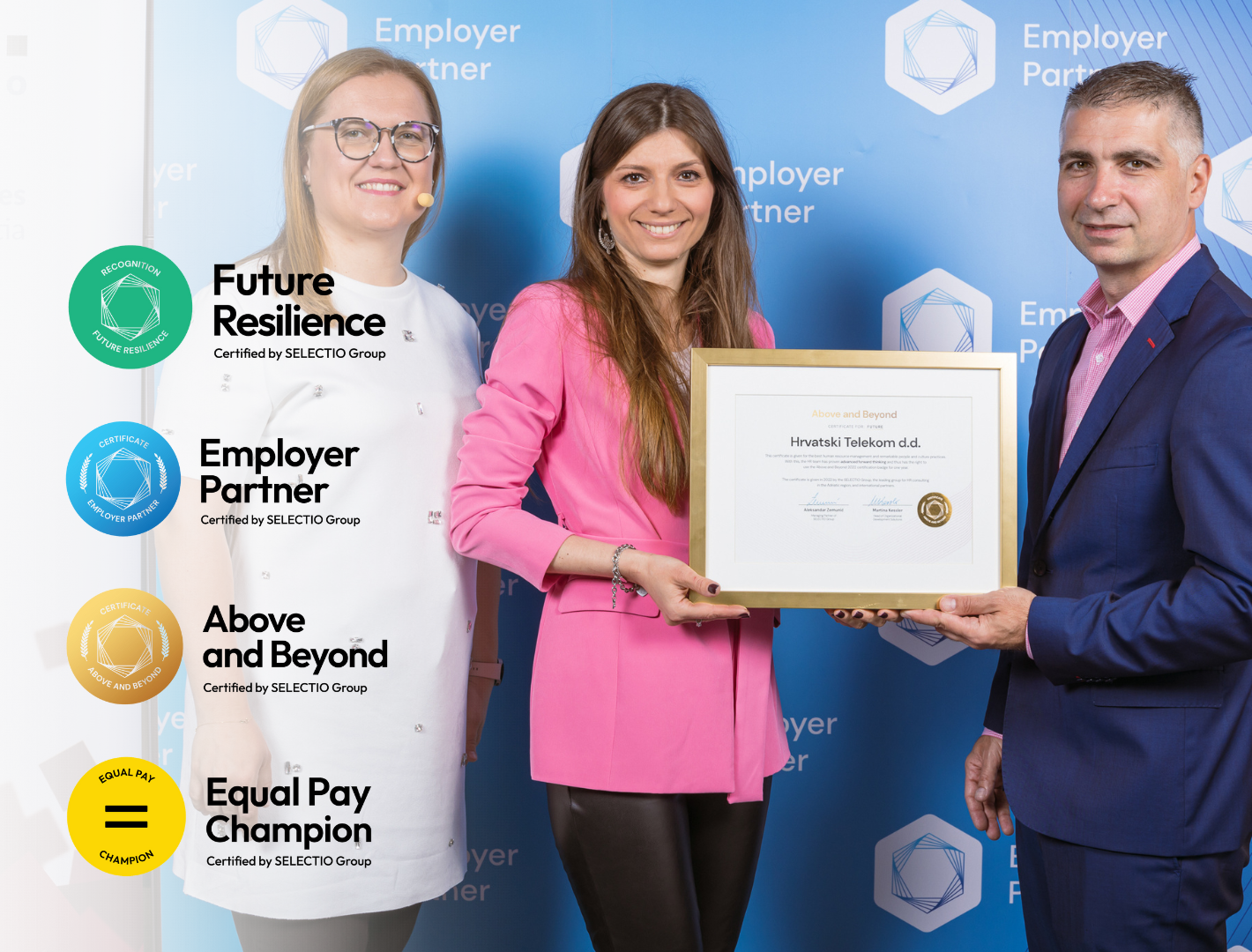Anamarija Minarski has honed her ten years of experience in various segments of HR, and today she is a Director of Talent Acquisition, Performance & Development Department at Croatian Telecom. She strategically and operationally oversees talent acquisition, development, and retention in one of Croatia's leading telecommunications companies.
Career development, HR consulting, coaching, HR practices, and assessment centres are just some of her areas of expertise, and at Croatian Telecom, she fosters a culture of excellence and growth. She strives to help employees reach their full potential and does not neglect the aspect of employee well-being in her work.
Thus, together with the management board and the HR team, she recognized the value of the Future Resilience program, which helps employees build resilience to personal and professional challenges as well as unpredictable and stressful life situations. Read her perspective on the importance of investing in mental health and learn about all the well-being benefits of the Future Resilience project.
1. What part of your job do you enjoy the most, and why do you love HR so much? What else, aside from the strategic search for talents, do you enjoy?
With more than ten years of experience in human resources management, I am passionate about developing people and organizations. Currently, at Croatian Telecom, I lead the employee development and education, as well as selection and recruitment processes. I love my job because it allows me to create an environment where people can grow and advance through innovations and new approaches in HR, in line with the fast-paced market changes and digital transformation. I particularly enjoy working on career development opportunities for my colleagues, helping them recognize and realize their potential.
I believe that motivated and satisfied employees are the foundation of every organization's success. Over the years, I have been part of key initiatives that have transformed corporate culture. I have also worked on implementing modern HR practices that have enabled better connectivity between employees and their professional development goals in alignment with the company's objectives.
Before joining Croatian Telecom, I worked in the FMCG industry, where I gained valuable experience in leading HR projects. I have a degree from the Faculty of Humanities and Social Sciences, but as I believe that continuous learning is essential for progress, I continually improve myself in various aspects of HR.
Apart from work, where I value innovation and progress, I enjoy spending time in nature, reading good books, and exploring new topics that inspire me. New challenges and opportunities for learning, both on a personal and professional level, always motivate me.
2. Do you believe that mental health education is important and necessary for every company? Why?
Mental health education is extremely important for every company, regardless of the industry, as it allows employees to better understand and manage challenges such as stress and anxiety. These kinds of trainings help create a work environment where employees feel supported and free to talk about their problems, reducing the stigma associated with mental health. In addition to positively impacting individual well-being, these trainings contribute to higher productivity, reduced absenteeism, and strengthened team cohesion. A company that cares about employee mental health is investing in their long-term motivation and engagement, and therefore in the success of the entire organization.
3. In your opinion, to what extent are employees today informed about the importance of mental health compared to five years ago?
Today, employees are much better informed about the importance of mental health than they were five years ago. Various factors have contributed to this change, including the increased media attention this topic has garnered recently and public health campaigns. Employer efforts to include mental health topics in their employee education and well-being programs also contribute to this awareness. The COVID-19 pandemic played a key role, as for many people, it meant increased stress and anxiety, further highlighting the importance of caring for mental health.
Nowadays, mental health is discussed more openly, and employees have greater access to resources and support than ever before. Many organizations integrate mental health topics into their policies, resulting in a higher level of awareness and understanding among employees. Although awareness has significantly increased, there is still room for improvement, especially in building a continuous culture that supports employee well-being at all levels.

4. What well-being benefits do you offer your employees (besides participation in the Future Resilience program)?
As part of our approach to well-being programs, I would particularly highlight the activities we organize during April, when we celebrate Health Month. World Health Day, April 7, was the occasion for various activities in past years, but last year and this year, we extended this initiative to the entire month. Every day, we offered something new to employees—lectures, activations, challenges, and other benefits and similar initiatives. When we gathered all the ideas and needs we wanted to address, we realized that one day of initiatives was not enough.
Thus, during Health Month, our employees had the opportunity to participate in various activities that encourage self-care. Since we view well-being holistically, we care not only about mental but also about physical health. This month allows us to further highlight everything we continuously do to support the health and well-being of our employees.
5. How did you motivate employees to join the Future Resilience program and openly share their experiences, concerns, and stress triggers?
To motivate employees to join the Future Resilience program and openly share their experiences, concerns, and stress triggers, we use all available channels to raise awareness about the importance of well-being and mental health, and we do this continuously. We promoted the program through our WELL@WORK activities, which are already well known to employees, and we use our internal social network to ensure that as many employees as possible are informed about the program and the resources available to them. That way we send a clear message that, as an employer, we recognize the importance of mental health care and fully support employees in actively participating and using the tools offered.
6. Which topic from the Future Resilience program would you highlight as the most interesting for your employees? Why do you think this particular topic is the most useful or interesting to them?
One of the topics from the Future Resilience program that I would highlight as the most interesting for our employees is the Parenting and Upbringing lecture series, which was incredibly successful. This was the first time we approached the topic of parenting in a structured way, and the results showed great interest among employees. We are especially proud of the high level of participation, with a total of 359 employees attending this series, with some attending all the lectures. We recognized the importance of this topic and provided employees with support in facing parental challenges. Through education, we offered them tools and advice that can ease their daily lives.
Parents often face the challenges of balancing work and family obligations, which then causes stress and affects productivity. These webinars provided practical advice and support to help them manage these challenges. Moreover, such initiatives foster a sense of belonging and loyalty because employees notice that the employer cares about their personal lives and well-being, which contributes to their long-term satisfaction and motivation.
Friendship-friendly workplace: How does friendship impact employee well-being?
If you also want to improve the well-being of your employees and empower them for daily challenges, both professional and personal—contact us. In addition to education and concrete tools for building resilience, the Future Resilience program provides employees with professional psychological support (anonymously, via phone).



